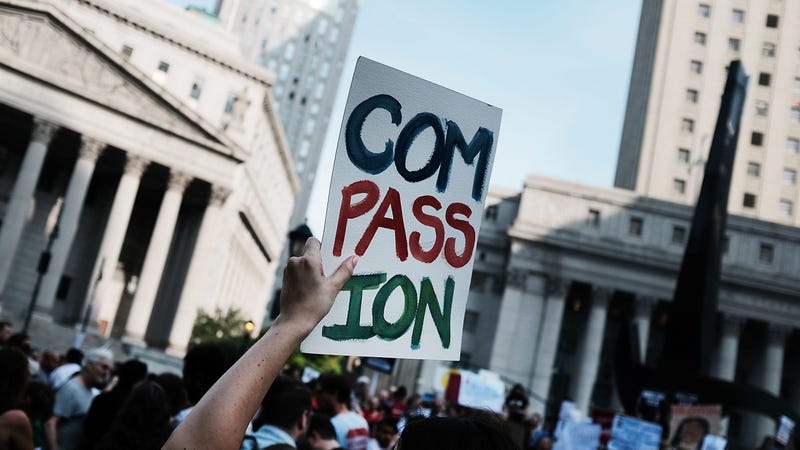 A June 1 protest in New York against the Trump administration’s policy to separate undocumented children from their parents at the border. Photo: Spencer Platt (Getty Images)
A June 1 protest in New York against the Trump administration’s policy to separate undocumented children from their parents at the border. Photo: Spencer Platt (Getty Images)
A series of heartbreaking investigative stories published Wednesday by Reveal and The Texas Tribune highlight the disturbing conditions many undocumented children have been allegedly forced to endure in privately run shelters set up to house them as they await proceedings to determine whether they can stay in the country. One of the more gruesome details includes allegations that children at the Shiloh Treatment Center near Houston, Texas were routinely dosed with unneeded antipsychotics to keep them quiet and compliant.
As per Reveal:
President Donald Trump’s zero tolerance policy is creating a zombie army of children forcibly injected with medications that make them dizzy, listless, obese and even incapacitated, according to legal filings that show immigrant children in U.S. custody subdued with powerful psychiatric drugs.
The filings are part of a lawsuit filed in April against the federal government for alleged mistreatment of children sent to Shiloh and other detention centers. The timeline of incidents appear to predate the recent trend of children forcibly separated from their parents at the border and mostly concerns children deemed unaccompanied minors who hoped to join a parent or guardian in the US.
The lawsuit includes devastating affidavits by children and parents about their alleged treatment at Shiloh, along with documentation that lays out the staggering number of drugs some children were allegedly told to take (as many as 18 pills in one day, according to one account). The lawsuit describes children who were given these medications supposedly to help treat their depression or other mental health issues. But in many cases, these children have alleged, they were told they had to take the drugs in order to see their parents again, while others were told the drugs were actually vitamins.
Most of the drugs mentioned in the lawsuit, such as olanzapine and quetiapine, are antipsychotics used to treat schizophrenia, bipolar disorder, and depression. But there are also drugs like prazosin, used to treat high blood pressure, post-traumatic stress disorder, and anxiety, and benzodiazepines like clonazepam, a tranquilizer used to manage seizures and panic attacks.
All antipsychotics work mainly by blocking the effects of dopamine, a neurotransmitter that normally helps neurons signal to one another in the brain but has also been implicated as a key factor in psychosis and schizophrenia. But while these drugs are moderately effective in adults, their rising use of antipsychotics in children is a controversial issue. There’s little safety data for many of these drugs commonly prescribed for children, especially those diagnosed with behavioral or aggression problems rather than a psychiatric illness. And there’s some evidence that many of the known side effects of these drugs—weight gain, tremors, and an increased risk of diabetes, to name a few—are more likely to happen in children, whose brains are still developing.
Benzodiazepines, meanwhile, depress a person’s brain activity, which make them a valuable tool to help manage seizures and sometimes anxiety. But they can also cause hallucinations and memory loss and increase the risk of suicide and depression. They can also become habit-forming, leading to withdrawal symptoms if people aren’t correctly eased off the medication. And prazosin’s blood-pressure lowering effects can cause dizziness, weakness, and fainting.
“You don’t need to administer these kinds of drugs unless someone is plucking out their eyeball or some such,” forensic psychiatrist Mark. J. Mills, who examined the medical records of these children made available through the court filings, told Reveal. “The facility should not use these drugs to control behavior. That’s not what antipsychotics should be used for. That’s like the old Soviet Union used to do.”
Mills is referring to the fact that dissidents in the Soviet Union were routinely subjected to unnecessary psychiatric treatment.
Gizmodo contacted Shiloh Treatment Center for comment and will update this post when we hear back.
The incidents documented in the filings have occurred during the Trump administration, but the problem extends far past Trump. As Reveal also reported Wednesday, private detention centers and shelters have been repeatedly cited for neglectful behavior, as well as sexual abuse and physical violence, toward detained children in recent years. But despite these complaints, Reveal’s investigation found that facilities accused of abuse or neglect have received more than $1.4 billion in federal funding by the Office of Refugee Resettlement since 2014.
[Reveal 1, 2]